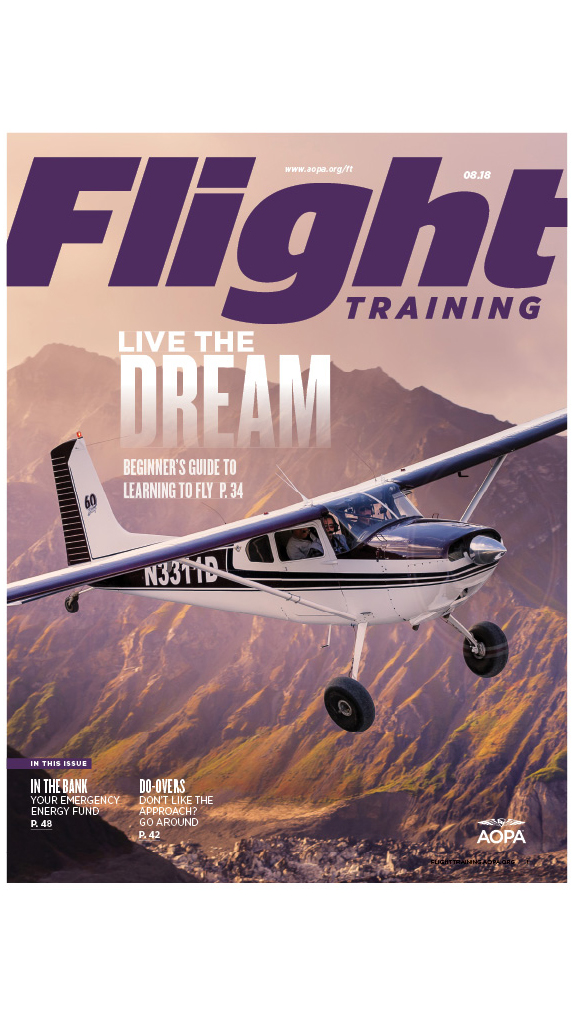
ASI NEWS
Get the weather?
Attend the AOPA Air Safety Institute’s new fall seminar to become weather-wise
By Machteld Smith
Weather is often blamed as the cause of accidents when, in reality, it’s poor decision making that’s the culprit. The go/no-go decision-making process starts long before entering the cockpit. But the right choice at a crucial moment before or during a flight can be difficult to make. When you attend the new “ASI Investigates: Weather Accidents” seminar you’ll learn:
- Why getting the big weather picture is important.
- How to improve your go/no-go decision-making process.
- Tips to “weatherize” your mindset and avoid traps like flying VFR into IMC.
- Why technology can be a great tool—and your worst enemy—in weather flying.
Starting at the crash scene and working backward, you’ll step into the shoes of an accident investigator and examine accidents in which weather played a role. ASI’s expert presenters guide the discussion about what went wrong, why, and how to avoid making the same mistakes.
Invite your pilot friends to join you at the 90-minute seminar and learn from the best. You can even fly yourself to the event. The seminar schedule identifies if a seminar is held at an aviation-themed location or an airport or both.
Web: www.airsafetyinstitute.org/seminars
FAA News
Good news for pilots
Training and certification changes save money
By Sarah Deener
If you’ve ever heard someone joke that the FAA’s motto is “We’re not happy until you’re not happy,” you have an inkling of the role bureaucracy and regulations play in everything from where pilots can fly to how much it costs to earn a pilot certificate. AOPA has been fighting unnecessarily burdensome regulations for close to 80 years—and a recent change to FAR Part 61 published by the FAA demonstrates that pilots’ voices are being heard.
AOPA has long sought these regulatory changes, which allow for broader use of technology to reduce the cost of training and proficiency and are expected to save the general aviation community more than $110 million in the next five years. The new regulations recognize the effectiveness of modern technology and ease past restrictions on its use. They are also crafted to give the FAA more flexibility to approve the use of advanced technology to come. The overhaul of FAR Part 61 includes these significant changes:
- Instrument-rated pilots who use an advanced aviation training device to satisfy flight experience requirements can earn six months of currency rather than two. They also may use any combination of aircraft and advanced aviation training device for currency. This takes effect November 24.
- An instructor’s presence will no longer be required to accomplish the required recency experience in a flight simulator or aviation training device (FFS, FTD, or ATD).
- A pilot may use technically advanced aircraft in lieu of a turbine-powered or complex airplane to satisfy certain commercial pilot certificate requirements. In April, the FAA discontinued the requirement that commercial pilot and flight instructor candidates conduct their single-engine airplane practical test in a complex airplane; as of August 26, commercial pilot candidates can use “technically advanced airplanes” in lieu of, or in combination with, a complex or turbine-powered airplane to satisfy the 10 hours of required training in these airplanes.
- Training received from a sport pilot instructor will count toward a higher certificate (such as a private pilot certificate).
News
Homer scholarship winners announced
Awards given in honor of UNITED Flight 93 pilot
By David Tulis
Two young pilots will advance their pursuit of aviation because of awards distributed to honor United Airlines Flight 93 first officer LeRoy W. Homer Jr., who died in the terrorist attacks of September 11, 2001.
London Holmes, of Bellevue, Washington, is a member of the Civil Air Patrol, the Red Tailed Hawks, the Museum of Flight in Seattle, and the National Honor Society. She will use the funds for flight training and to help prepare for what she hopes will turn into a career with the U.S. Air Force.
Angelo Cervantes, of Ramona, California, is an Eagle Scout, a founding member of an Aviation Career Explorer post, an EAA AirVenture volunteer, and a student pilot learning to fly sailplanes and airplanes. He graduated from Mountain Valley Academy in 2018 and will attend Arizona State University with an eye on becoming an airline pilot.
The students are the LeRoy W. Homer Jr. Foundation’s twentieth and twenty-first recipients, the foundation’s executive director Pauline Smith said. The organization’s goals are to encourage and to support young adults pursing aviation as a career, she noted.
 The Association of Media and Publishing recognized Flight Training magazine with its top award for Magazine Redesign in the 38th annual EXCEL awards, which honor “the best and the brightest in association media and publishing.” Flight Training Art Director Liz Jones accepted the award. Also recognized was the November 2017 AOPA Pilot magazine cover of the solar eclipse and the Eclipse jet by Senior Photographer Chris Rose with the Gold Award; the Hangar Talk podcast with a Silver Award; feature article design for “Doing the Lindy Hop” in AOPA Pilot with a Silver Award; and a Bronze Award for AOPA Pilot for Overall Excellence.
The Association of Media and Publishing recognized Flight Training magazine with its top award for Magazine Redesign in the 38th annual EXCEL awards, which honor “the best and the brightest in association media and publishing.” Flight Training Art Director Liz Jones accepted the award. Also recognized was the November 2017 AOPA Pilot magazine cover of the solar eclipse and the Eclipse jet by Senior Photographer Chris Rose with the Gold Award; the Hangar Talk podcast with a Silver Award; feature article design for “Doing the Lindy Hop” in AOPA Pilot with a Silver Award; and a Bronze Award for AOPA Pilot for Overall Excellence.

